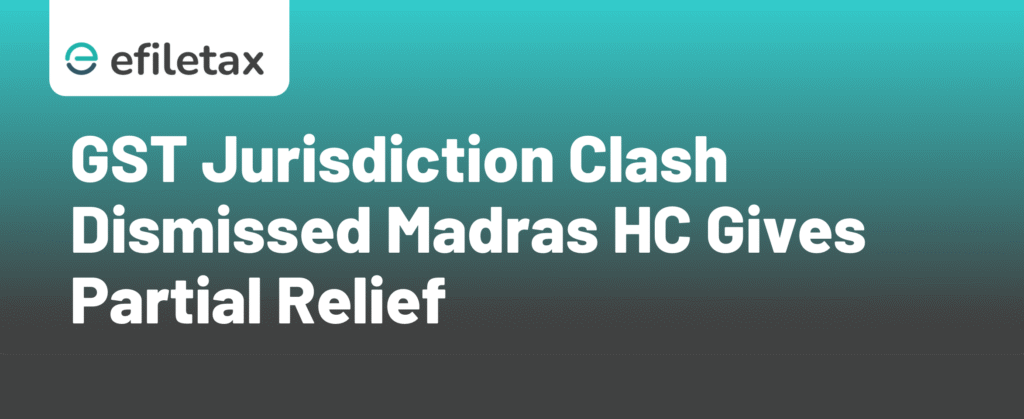
GST Jurisdiction Overlap Dispute: Madras HC Clarifies Boundaries
In a significant ruling on GST jurisdiction overlap, the Madras High Court has provided much-needed clarity for taxpayers facing simultaneous notices from both Central and State GST authorities. The judgment in 2025 TAXSCAN (HC) 1263 addressed a writ petition filed by a taxpayer alleging double jeopardy under CGST and SGST laws.
Let’s break down what this means for businesses and how it affects your compliance strategy.
Background of the Case
The petitioner — a registered GST payer — was served show cause notices (SCNs) from both Central and State tax authorities on similar grounds.
The taxpayer claimed:
- Both authorities were alleging the same set of facts.
- This amounted to harassment and double assessment.
- The action violated Section 6(2)(b) of the CGST Act, 2017, which prohibits parallel proceedings once initiated by one authority.
What Section 6(2)(b) of CGST Act Says
Here’s what the law provides:
“Where a proper officer under the CGST Act has initiated proceedings, the proper officer under the SGST/UTGST Act shall not initiate any action on the same subject matter.”
This aims to avoid duplication of effort and ensure taxpayers are not targeted by multiple authorities for the same issue.
High Court’s Findings
The Madras High Court ruled that:
- No case of actual overlap was made out by the petitioner.
- The authorities had not initiated action concurrently on the same subject matter.
- However, the Court noted that any future duplicity must be avoided.
Partial relief granted:
The Court directed that the second authority (State) shall proceed only if there is a distinct issue not already covered by the Central SCN.
Key Takeaways for GST Payers
1. Avoiding Duplication:
If you receive multiple notices, check if both are based on the same facts. Use Section 6(2)(b) to challenge overlap.
2. Legal Remedy Available:
You can file a writ petition in the High Court if double assessment is initiated without basis.
3. Keep Records Clean:
Proper documentation can prove that one authority has already acted — making a case for quashing the second notice.
Expert View: Practical Advice for Businesses
“Before responding to any GST SCN, always verify if another authority has already acted on the same issue. Businesses should consult their GST advisor to invoke Section 6 protections when needed,” says a Chennai-based indirect tax expert.
Subheading with Focus Keyphrase
GST Jurisdiction Overlap: When Can You Legally Object?
You can raise objection under GST jurisdiction overlap if:
- Both CGST and SGST officers issue notices on the same period and same grounds.
- One authority begins an audit or investigation, and the other sends a parallel notice.
In such cases:
- Respond quoting Section 6(2)(b).
- Attach copy of the initial SCN.
- Request for withdrawal of the second notice.
Government Position on GST Jurisdiction
As per CBIC Circular No. 03/2017-GST dated 05.07.2017, administrative control was initially distributed between Central and State authorities based on taxpayer turnover and registration.
However, over the years, with audits, investigations, and AI-driven risk selection models in place, overlapping scrutiny is increasing.
This judgment helps set a judicial precedent to safeguard taxpayer rights under a dual control regime.
Comparison Table: Central vs State GST Jurisdiction
| Basis | Central GST (CGST) Authority | State GST (SGST) Authority |
|---|---|---|
| Turnover < ₹1.5 Cr | 10% control | 90% control |
| Turnover > ₹1.5 Cr | 50% control | 50% control |
| Investigation Rights | Yes | Yes |
| Concurrent Action Allowed | Only if facts are different | Only if facts are different |
(Source: CBIC Circular No. 01/2017-GST and 03/2017-GST)
Summary
Madras High Court clarifies that both Central and State GST authorities cannot proceed on the same issue simultaneously. Section 6(2)(b) of CGST Act prohibits dual action. Taxpayers must invoke this if facing parallel notices. Partial relief was granted in the 2025 ruling.
FAQ Section
Q1. Can both CGST and SGST authorities send notices on the same issue?
No, once one authority initiates proceedings, the other cannot take parallel action on the same issue under Section 6(2)(b).
Q2. What should I do if I receive duplicate GST notices?
File a reply quoting Section 6(2)(b), attach previous SCN copy, and request withdrawal. You may approach the High Court if needed.
Q3. Does this rule apply to audits as well?
Yes. The same logic applies. Once audit is initiated by one authority, the other cannot re-audit the same period.
Need help responding to GST notices or avoiding overlapping jurisdiction issues?
Talk to our experts at Efiletax. We help businesses navigate GST litigation, audit defence, and SCN replies — accurately and on time.